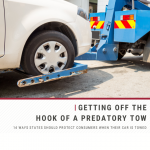
Getting off the Hook of a Predatory Tow
14 Ways States Should Protect Consumers When Their Car is Towed
PennPIRG Education Fund identified 14 common sense towing protections that should be available to consumers in every state, and researched which states offer those safeguards.
Downloads
PennPIRG

Every year, millions of Americans have their cars towed. In some cases, the vehicle was parked improperly, the driver tracks it down and pays the bill without incident. Other times, the vehicle owner may face an array of unfair circumstances. Predatory practices following an initial tow can range from charging exorbitant fees to refusing the owner access to personal items in their car during business hours.
In still other cases, the driver’s vehicle wasn’t really parked improperly and was towed illegally.
Under the best circumstances, getting towed is an ordeal, even when justified. For many drivers, however, the situation is compounded because consumer towing protections in most states are weak, nebulous or non-existent.
A 2018 survey from the Property Casualty Insurers Association of America identified excessive rates and fees as “the worst problem insurers and consumers face with towing companies,” followed by other predatory practices such as hurdles to retrieving a car or not giving drivers access to wallets, medication or other items in a locked storage yard. (2)
PennPIRG Education Fund identified 14 common sense towing protections that should be available to consumers in every state, and researched which states offer those safeguards. These protections range from who is responsible for damages caused by careless towing to the maximum rates and fees owed when towed.
You can find out which states offer which protections using our search-by-state tool on PennPIRG Education Fund’s site.
Towing laws aren’t something most of us pay attention to until a tow affects us or someone we know. We may see more of it this year. The $8 billion a year towing industry is expected to grow by 11 percent in 2021, after average annual growth of only 2 percent a year since 2016, according to IBISWorld, which conducts industry research on thousands of industries worldwide. That does include both consensual tows, after a break down or wreck, and nonconsensual tows, for allegedly parking or leaving your vehicle someplace you shouldn’t.
Our research points to two broad issues facing consumers: An alarmingly high number of states have no protections spelled out on issues such as whether a consumer is entitled to an itemized bill or reimbursement if their car is damaged. In addition, too many states have inadequate protections, or the laws on the books are vague or overwrought and inaccessible to the average consumer.
It’s important to note that many municipalities have protections that are stronger than those offered by state law. Some cities have even adopted a “towing bill of rights” to address years of abusive practices. This shouldn’t be necessary; drivers in every city in a state should have the same, strong rights. This needs to change.
Topics
Find Out More


Fixed for the Holidays

Trouble in Toyland 2023

